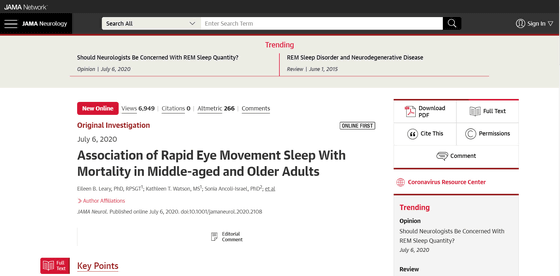'Reduced REM sleep increases risk of death,' research reveals

In human sleep, '
Association of Rapid Eye Movement Sleep With Mortality in Middle-aged and Older Adults | Neurology | JAMA Neurology | JAMA Network
https://jamanetwork.com/journals/jamaneurology/article-abstract/2767713

Less REM sleep increases death risk: JAMA Neurology
https://jamanetwork.com/journals/jamaneurology/article-abstract/2767713
Less REM sleep increases death risk: JAMA Neurology
https://medicaldialogues.in/neurology-neurosurgery/news/less-rem-sleep-increases-death-risk-jama-neurology-67831
REM Sleep REM (REM) is an abbreviation for 'Rapid Eye Movement', which is named because the eye moves rapidly while sleeping. During REM sleep, the body relaxes due to muscle relaxation, but the brain is active. During sleep, humans repeat REM sleep and non-REM sleep approximately every 90 minutes, and it is said that REM sleep takes about 20 to 25% of the total sleep time.
A research team studying sleep at Stanford University, including Eileen B. Leary, conducted a study of sleep disorders in older men (MrOS) from December 2003 to March 2005, and collected from 1988. We have compiled data from the Wisconsin Sleep Cohort (WSC) and analyzed REM sleep and mortality data. The number of MrOS participants was 2675, the average age was 76.3, and the number of WSC participants was 1386, the average age was 51.5.
As a result, participants in MrOS tended to have a 13% higher mortality rate for every 5% decrease in REM sleep time. It seems that similar results were obtained for various causes of death such as cardiovascular system and cancer. In particular, those who spent less than 15% of their REM sleep hours had 1.2 to 1.35 times more mortality than those who had more than 15%.
WSC participants were also younger than MrOS, including women as well as men. Despite the fact that WSC data had a longer follow-up period than MrOS, it seems that the same trend as that seen with MrOS could be confirmed. Furthermore, when classified by sex, women tended to have a higher risk of death due to a decrease in REM sleep time than men. The research team claims that a strong association was found between REM sleep rates and mortality in two independent data sets.

``Basically, we still don't know much about the function of REM sleep. In recent years, it has become clear that REM sleep is deeply involved in memory integration and synapse reconstruction. 'Given the complex and underlying biological function, further research is needed to understand whether this association is causal,' he said.
Related Posts:
in Science, Posted by log1i_yk







